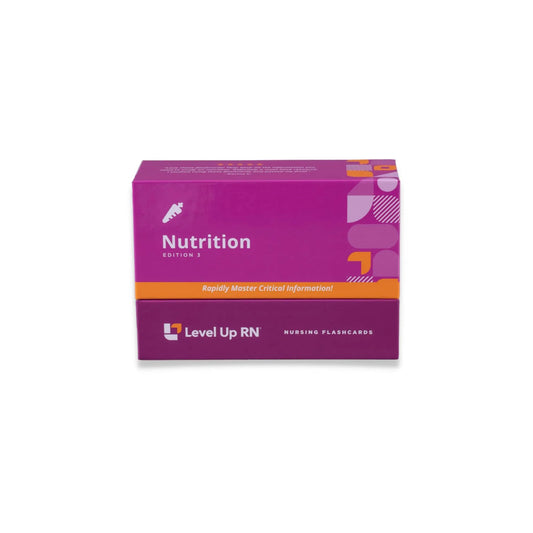Hi, I'm Cathy with Level Up RN. In this video, I'm going to continue my coverage of topics from our Level Up RN Nutrition Flashcard deck. Specifically, I'll be talking about nutrition for older adults. And at the end of the video I'm going to give you guys a quiz to test your understanding of some of the key points I'll be covering. So definitely stay tuned for that. And if you have our Level Up RN flashcards, go ahead and pull them out so you can follow along with me and pay close attention to the bold red text on the back of the cards, because those are the things that you are likely to get tested on in nursing school.
Let's start by talking about changes that occur as we get older that affect nutrition. So one thing that changes is that our basal metabolic rate decreases, which means we need a decreased amount of calories each day. Another thing that decreases is our bone density. So older adults are at increased risk for osteoporosis as well as fractures if they fall. Of note, bone loss begins at 30 to 40 years of age. Salivation also decreases as we get older, and older adults have an increased risk for dysphagia, which is difficulty swallowing. And this, in turn, can lead to aspiration, which is where food goes down into the airways as opposed to the stomach. And that, in turn, can cause aspiration pneumonia. Appetite and sense of taste also decrease as we get older, which places an older adult at increased risk for malnutrition. Sense of thirst also decreases, which often results in decreased fluid intake, which increases the risk for dehydration. And then finally, bowel motility also decreases as we get older. So that, coupled with decreased fluid intake and decreased levels of activity, can result in constipation.
Let's now touch on nutrition and lifestyle guidance for older adults. It's recommended that older adults increase their intake of protein to improve muscle mass, strength, and function. Increased fluid intake is also advised to prevent dehydration, constipation, and urinary tract infections. Older adults should also increase their intake of fiber to prevent constipation, improve their cholesterol levels, and regulate blood sugar levels. And then in order to prevent osteoporosis, which is a disorder that causes weak and brittle bones, it's important that older adults get enough calcium and vitamin D, avoid smoking, and avoid heavy alcohol intake. They also need to engage in weightbearing exercise, such as walking, as well as strength training. Of note, swimming is great for cardiovascular health and is easy on the joints, but it is not a weightbearing exercise. So on a nursing school exam, if you have a question that is asking you to select exercises that would be appropriate for preventing osteoporosis and swimming is one of the options, then you do not want to select that.
All right. It's quiz time, and I've got four questions for you. Question number one: How is basal metabolic rate affected by older age?
The answer is it is decreased.
Question number two: How is bowel motility affected by older age?
The answer is it's decreased.
Question number three: What type of exercise helps to prevent osteoporosis?
The answer is weightbearing exercises and strength training.
Question number 4: Swimming is a weightbearing exercise. True or false?
The answer is false.
All right. That's it for this video. I hope it was helpful. Thank you so much for watching, and good luck with school.
[BLOOPERS]
Let's start off about-- start off by learning how to talk. How is bowel motility? Yay.


